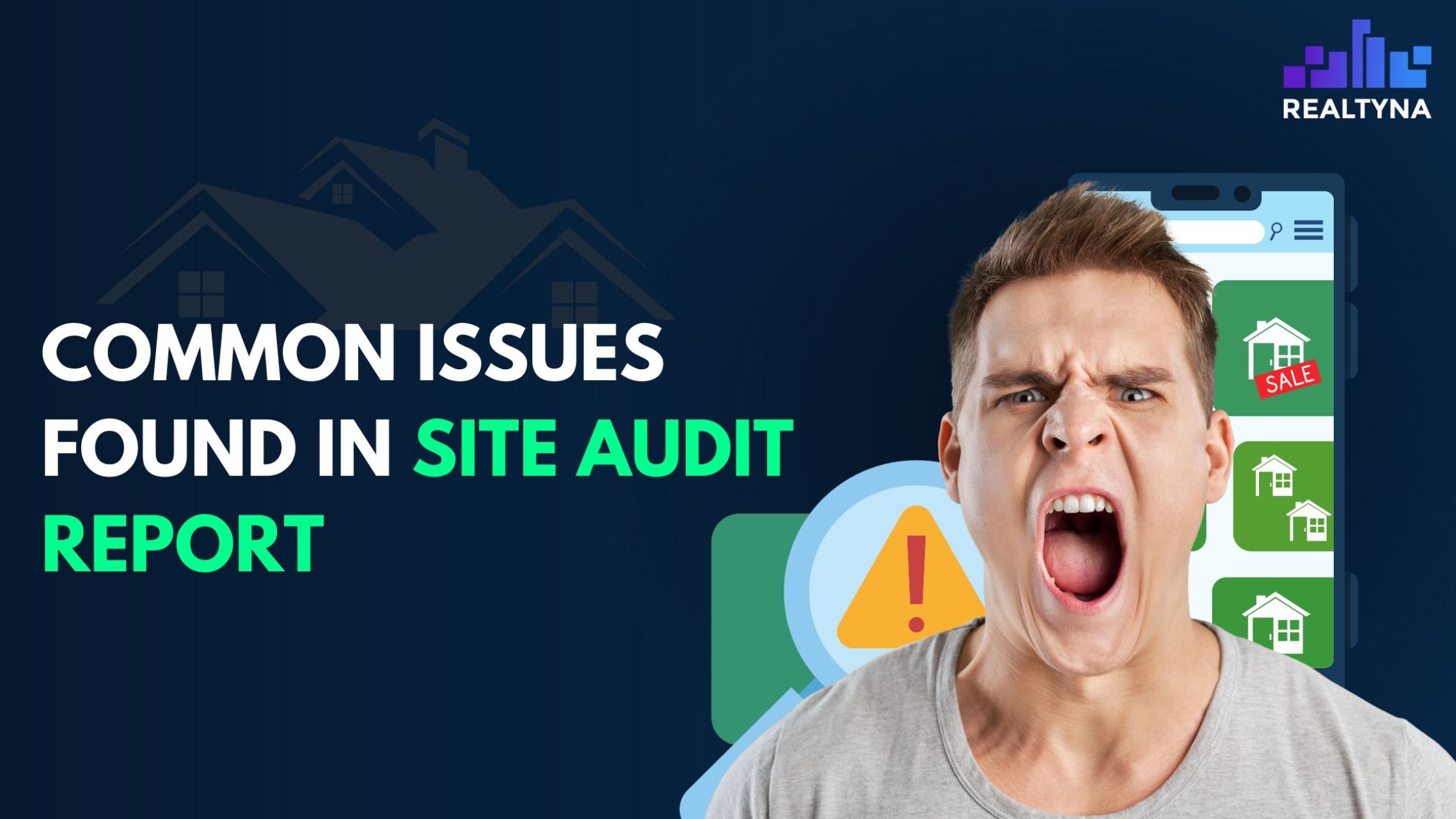
What is a Site Audit Report for Real Estate Websites
A Site Audit Report for Real Estate Websites provides a comprehensive analysis of the website’s performance, identifying areas for improvement and optimization. It examines various aspects such as site structure, content quality, user experience, SEO, and technical issues.
No matter which Types of Real Estate Websites you currently have, this report helps real estate website identify and address any issues that may be hindering their online visibility and user engagement, ultimately improving overall performance and success in the competitive real estate market.
Importance of Site Audit Reports for Real Estate Websites
Real estate websites are often complex, with a vast amount of content, property listings, and interactive features.
A site audit report is crucial for Real Estate SEO, these reports offer a holistic evaluation of the website’s performance, identifying areas that require attention.
It serves as a roadmap for real estate businesses to enhance their website’s functionality, user experience, and search engine optimization.
By addressing the issues highlighted in the report, real estate websites can attract more qualified leads, improve conversion rates, and ultimately gain a competitive edge in the market.
Site audit reports also play a pivotal role in ensuring compliance with industry standards and best practices. With the ever-evolving landscape of digital marketing and web development, staying updated with the latest trends and algorithms is essential for real estate websites to maintain their relevance and authority in the online sphere.
A thorough site audit report provides actionable recommendations to align the website with current best practices, ensuring that it remains competitive and effective in capturing the attention of potential homebuyers and sellers.
In addition, site audit reports can uncover technical issues that may be hindering the website’s performance. From page load times and mobile responsiveness to broken links and metadata errors, identifying and rectifying these technical glitches can significantly enhance the overall user experience and search engine visibility of real estate websites.
Ultimately, a well-executed site audit report empowers real estate businesses to optimize their online presence, drive organic traffic, and establish themselves as trustworthy and reliable sources in the competitive real estate market.
Key Components of a Site Audit Report
A comprehensive site audit report for real estate websites encompasses various key components, each playing a crucial role in evaluating the website’s performance and identifying areas for improvement. These components include:
- Site Structure: This component evaluates the organization and navigation of the website, ensuring that it is intuitive and user-friendly. It assesses the hierarchical structure of the website, the accessibility of important pages, and the overall user journey through the site.
- Content Quality: The quality and relevance of content are pivotal for real estate websites. A site audit report analyzes the uniqueness, depth, and optimization of the content, including property descriptions, SEO Titles and Meta Descriptions, blog posts, and informational pages, to ensure that it resonates with the target audience and aligns with SEO best practices.
- User Experience (UX): Evaluating the website’s UX involves assessing factors such as page load times, mobile responsiveness, interactive elements, and overall design aesthetics. A seamless and engaging user experience is essential for keeping visitors engaged and encouraging them to explore property listings and relevant information.
- SEO Analysis: This component delves into the website’s search engine optimization strategies, including keyword usage, meta tags, backlink profiles, and overall on-page and off-page optimization. It aims to identify opportunities for improving the website’s visibility and ranking on search engine results pages.
- Technical Issues: Technical aspects such as website speed, security, mobile-friendliness, and crawlability by search engines are critical for the website’s overall performance. A site audit report identifies and prioritizes technical issues that may be affecting the website’s functionality and visibility.
Each of these components contributes to a comprehensive understanding of the real estate website’s current state and provides actionable insights for enhancing its performance and relevance in the highly competitive digital landscape.
Common Issues Found in Site Audit Reports for Real Estate Websites
 Site audit reports often reveal common issues that can impact the performance and effectiveness of real estate websites. These issues may include:
Site audit reports often reveal common issues that can impact the performance and effectiveness of real estate websites. These issues may include:
- Duplicate Content: Real estate websites frequently encounter duplicate content issues, especially when property listings are syndicated across multiple platforms. Addressing duplicate content through canonical tags and unique, descriptive content is essential for avoiding penalties from search engines and improving organic visibility.
- Page Load Times: Slow-loading pages can significantly impact the user experience and lead to higher bounce rates. Site audit reports highlight pages with extended load times and provide recommendations for optimizing images, scripts, and server response times to enhance overall page speed.
- Broken Links: Broken links within a real estate website can frustrate visitors and harm the site’s credibility. Site audit reports identify broken links and guide on updating or removing them to maintain a seamless user experience.
- Mobile Responsiveness: With a growing number of users accessing real estate websites via mobile devices, ensuring mobile responsiveness is crucial. Site audit reports evaluate the website’s performance on various devices and provide suggestions for improving responsiveness and usability across different screen sizes.
- Metadata and Structured Data Issues: Optimizing metadata and structured data is essential for improving the website’s visibility in search results. Site audit reports identify missing or poorly optimized metadata and structured data, offering recommendations to enhance the website’s search engine presence.
Site Audit Reports might not cover all the important issues your website might have, issues related to Robots.txt and Sitemap.xml should be reviewed manually. Don’t know how? Follow the links we mentioned.
Tools for Generating Site Audit Reports for Real Estate Websites
In the digital marketing landscape, numerous tools are available to streamline the process of generating comprehensive site audit reports for real estate websites. These tools offer robust features for analyzing various aspects of website performance and delivering actionable insights for optimization. Some notable tools for generating site audit reports include:
- Moz Pro: Moz Pro provides a suite of SEO tools, including site audit capabilities that assess technical, content, and link issues affecting real estate websites. It offers actionable recommendations and prioritizes issues to enhance website performance.
- Semrush: Semrush offers comprehensive site audit features that analyze on-page SEO, technical SEO, and content issues. Real estate professionals can leverage Semrush to identify and address critical areas for improvement.
- Ahrefs: Ahrefs’ site audit tool provides in-depth insights into a real estate website’s technical health and SEO performance. It offers detailed reports on issues such as broken links, crawlability, and mobile-friendliness.
- Screaming Frog: The Screaming Frog SEO Spider tool enables real estate professionals to conduct thorough site audits by analyzing URLs, metadata, page titles, and other critical SEO elements. It provides detailed reports for technical and on-page optimizations.
As a Real Estate SEO Expert and also the writer of this content, I recommend Ahrefs, Learn more about this amazing tools at this link: https://ahrefs.com/site-audit/
Case studies of successful site audit implementations in real estate
Several real estate businesses have successfully leveraged site audit reports to enhance their website’s performance and achieve tangible results in the competitive online landscape. These case studies demonstrate the impact of site audits on real estate websites and highlight the outcomes of strategic optimization efforts:
Case Study 1: Real Estate Agency XYZ
Real Estate Agency XYZ, a leading player in the local property market, commissioned a comprehensive site audit to identify opportunities for improving their website’s performance. The audit revealed several key areas for enhancement, including slow page load times, inconsistent metadata, and content duplication across property listings.
Armed with the insights from the site audit report, Real Estate Agency XYZ implemented targeted improvements, including optimizing images to improve page speed, standardizing metadata across listings, and implementing canonical tags to address duplicate content issues. As a result, the website experienced a notable increase in organic traffic, higher search engine rankings for key property keywords, and improved user engagement metrics.
Case Study 2: Property Management Company ABC
Property Management Company ABC sought to strengthen its online presence and generate more qualified leads through strategic website optimization. A site audit report uncovered significant mobile responsiveness issues, outdated content, and suboptimal internal linking structures within the website.
Using the recommendations from the site audit report, Property Management Company ABC revamped its website to prioritize mobile responsiveness, refreshed outdated content with valuable insights and market trends, and restructured internal linking to improve user navigation. These efforts led to a substantial increase in website conversions, improved search engine visibility, and enhanced user satisfaction with the website’s mobile experience.
How Can Realtyna Help You Improve Your Website’s Health?
At Realtyna, we offer plenty of SEO Plans and Packages. If you don’t have enough time or resources to improve your website health with the help of Site Audit Reports, we are here to help you.


Sorry, the comment form is closed at this time.